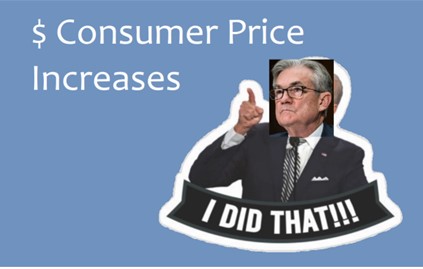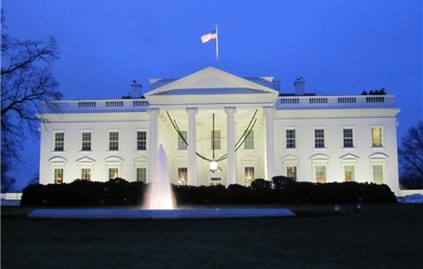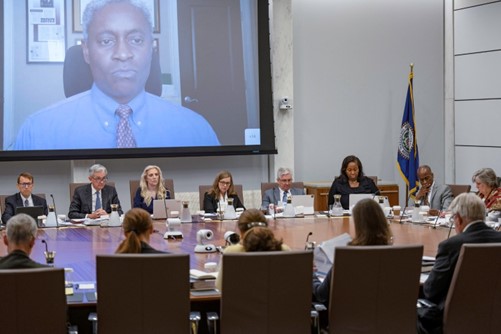Image: FOMC participants gather for a two-day meeting held on June 14-15, 2022. (Fed Reserve)
Will a Third Mandate be Added to the Fed’s Challenges?
The House of Representatives just passed a bill that would add to the Federal Reserve’s monetary policy mandates. Currently, the Fed’s dual mandate is to seek maximum employment and maintain stable prices. If H.R. 2543 passes the Senate, the Fed mandate would also include “exercise all duties and functions in a manner that fosters the elimination of disparities across racial and ethnic groups with respect to employment, income, wealth, and access to affordable credit.”
With the current mandates, the central bank is thought to be able to act independently to achieve stable prices and maximum employment. However, the Federal Reserve is always accountable to Congress. As we saw in late June, The Fed Chair testifies and reports to Congress on how the Federal Reserve is managing policy. They can be quite critical at these hearings, and there is often significant disagreement about how the economy should be handled.
The House bill passed last week 215-207 with little media notice. But it deserves attention because it may add a new layer of difficulty in implementing monetary policy.
Among those in the House that voted the amendment down is Congresswoman Stephanie Murphy of Florida. In her statement, she wrote, “The Federal Reserve’s dual mandate for monetary policy is to pursue price stability and maximum employment. At a time when Americans are facing the highest rate of inflation in four decades, the Federal Reserve’s priority should be to combat inflation without causing undue harm to economic growth and employment. By giving the Fed a new mandate, the bill could divert the Fed from its main mission and therefore cause harm to the very people it seeks to help. Those who stand to benefit the most from successful Federal Reserve action—and to lose the most from unsuccessful Fed action—are working families, including communities of color, struggling to afford gas, groceries, and other necessities.”
Supporters of the effort look at the broader implications beyond monetary policy, “I was proud to support the Financial Services Committee’s legislation today and thank Chairwoman Waters for her leadership. As we address inflation and work to bring costs down for American families and small businesses, Congress must ensure that Americans aren’t losing money as a result of discrimination in lending, ” said House Majority Leader Steny Hoyer.
The White House, which does not always comment on legislation, has thrown its support behind the bill. “The Administration strongly supports efforts to promote equity for underserved communities and increase access to safe and affordable financial services, wealth, and economic opportunity for all
Americans.” Earlier this month the President met with the Fed Chairman Powell, promising not to interfere with Fed policy and leaving the Federal
reserve responsible for Fed policy and outcomes. The rare meeting between a Fed Open Market Committee (FOMC) chairman and a sitting President seemed to highlight the autonomy under which the Fed works to achieve its mandates. Biden openly told Powell prior to the closed-door meeting that addressing inflation was his “top priority” and added that his plan “starts with a simple proposition: respect the Fed.”
If passed by the Senate and signed into law H.R. 2543, would raise some challenges for the Federal Reserve. An example of the challenges could be that by stimulating to promote employment, asset prices rise, which makes them less affordable; by not stimulating, employment can be lackluster.
We can see how the Fed is in a box now. If they fight inflation, they could weaken an economy to the point of causing a recession. If they don’t, inflation may continue to be a problem. If a third mandate is introduced, they would find themselves even further constrained by competing priorities. The Bill is now moving to the Senate. Sign up for Channelchek emails to stay updated on this and other important market-related information.
Managing Editor, Channelchek
Suggested Content
 Inflation Sticker Shock to be on Powell Says President
|
 The Fed, The President, and The Consumer
|
 Investors Always Have to Play the Cards They’re Dealt
|
 What Investors Haven’t Yet Noticed About the Value in Some Biotechs
|
Sources
https://www.federalreserve.gov/aboutthefed/files/the-fed-explained.pdf
https://murphy.house.gov/news/documentsingle.aspx?DocumentID=2032
https://www.whitehouse.gov/wp-content/uploads/2022/06/HR-2543SAP.docx.pdf
Stay up to date. Follow us:

|
